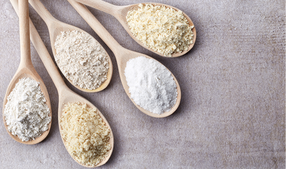Botanical ingredients can offer formulators opportunities for adding more protein, incorporating fiber, or showcasing a trendy flavor profile within lactose-free dairy spaces.
March 11, 2020

The dairy case at the grocery store looks very different from 10 years ago, let alone 50 years ago, with an expanding assortment of plant-based milk options and lactose-free products. Countless consumer surveys report no substantial rise in veganism or vegetarianism, but rather a noticeable increase in a category of consumers the industry has coined “flexitarians.”
Flexitarians are those seeking to reduce their overall animal-based consumption, including meat and dairy products. Today’s consumers are choosing plant-based dairy, specifically, for varying reasons: animal welfare, environmental concerns and personal nutrition, to name a few. This shift, paired with the amazing advances in product development, has made it easier for consumers to either add plant-based dairy along with animal-based dairy, or replace it altogether.
Soy milk is often credited with starting the specialty category of plant-based milk, but other sources like almond, coconut, rice and the newest rock star, oat, have all had gains in market share. Most plant-based milks provide significantly less protein than dairy milk, aside from soy which matches. This is where plant protein concentrates can step in and close the gap.
One area where brands can differentiate is added protein in concentrate form to boost the overall protein per serving. Some challenges might arise, such as negative flavor or even texture impact since most plant proteins are not 100% water-soluble. This can be overcome with quality R&D and the appropriate production protocol. Claims surrounding protein are so impactful that the added formulation challenges will be worth it, as consumers look to add more protein to their diet. A direct, front-of-label claim related to protein can boost the chance of success with a new product launch.
Botanical ingredients can offer formulators opportunities for adding more protein, incorporating fiber, or showcasing a trendy flavor profile, providing ample room for innovation and new product development within both the plant-based and lactose-free dairy spaces.
To read this article in its entirety, check out the Formulating for Success in the Dairy Alternative Aisle – digital magazine.
Alison Pomaville has extensive expertise in food and beverage product development and a strong understanding of the most recent science and technological advancements in food science. She works to help create custom solutions for Martin Bauer Group’s food and beverage clients and was a member of the inaugural class to receive Certified Food Scientist designation from IFT.
About the Author(s)
You May Also Like






